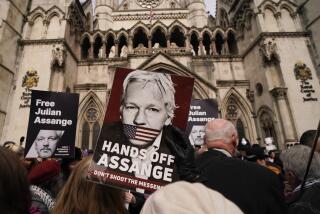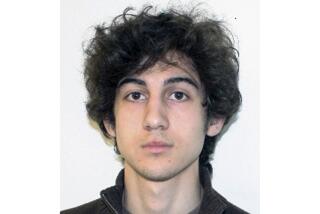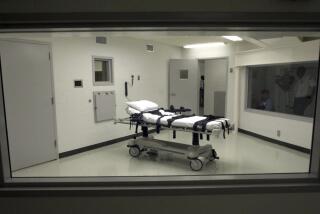Government to seek death penalty for Boston Marathon bombing suspect
WASHINGTON -- Federal prosecutors announced today they will seek the death penalty for Dzhokhar Tsarnaev in connection with last year’s Boston Marathon bombing, saying in federal court papers that the attack that killed three people and injured hundreds of others was committed in an “especially heinous, cruel and depraved manner.”
It marks the first time the Obama administration will attempt to execute an accused terrorist in a federal court case.
However, given that Tsarnaev is portrayed by his legal defense team as under the spell of his now-deceased older brother, and that there have been no legal executions in Massachusetts in more than 65 years, it may be tough for prosecutors to obtain the ultimate punishment there.
The Justice Department announced the decision to seek the death penalty in a two-sentence statement from Atty. Gen. Eric H. Holder Jr.
“After consideration of the relevant facts, the applicable regulations and the submissions made by the defendant’s counsel, I have determined that the United States will seek the death penalty in this matter,” Holder said. “The nature of the conduct at issue and the resultant harm compel this decision.”
TIMELINE: Tsarnaev family history
In an eight-page court filing on the decision, signed by Carmen M. Ortiz, the U.S. attorney in Boston, prosecutors cited “substantial planning and premeditation” in the April 15 attack, the fact that there were “multiple killings,” and that one of those killed, an 8-year-old boy named Martin Richard, was a particularly “vulnerable victim.”
Further, prosecutors termed 20-year-old Tsarnaev’s alleged role a betrayal of the United States.
“Dzhokhar Tsarnaev received asylum from the United States, obtained citizenship and enjoyed the freedoms of a United States citizen, and then betrayed his allegiance to the United States by killing and maiming people,” the papers said.
Prosecutors said the Boston Marathon was selected because it “draws large crowds of men, women and children by its final stretch, making it especially susceptible to the act and effects of terrorism.”
Massachusetts has not executed a convicted murder since 1947, when two gangsters who had killed a former Marine were sent to the electric chair.
ALSO:
Across snow-struck Atlanta it’s a case of ‘Dude, where’s my car?’
Shell abandons plan for Alaska offshore drilling
Maryland mall shooter wrote in journal that he was ‘ready to die’
More to Read
Start your day right
Sign up for Essential California for news, features and recommendations from the L.A. Times and beyond in your inbox six days a week.
You may occasionally receive promotional content from the Los Angeles Times.







